Musashi Miyamoto
Info
Bio-Data
- True Name: Shinmen Musashi-no-Kami Fujiwara-no-Harunobu
- Class: Saber
- Source: Japanese Historical Fact
- Region: A different Lostbelt
- Gender: Female
- Alignment: Chaotic Good
- Height: 167 cm
- Weight: 56 kg
Meta
- Character Creator: Kinoko Nasu
- Character Illustrator: Hirokazu Koyama
- Character Voice: Ayane Sakura
- Appearance in Main Works: Fate/Grand Order
Stats
| Parameters | Values |
|---|---|
| Strength | B |
| Constitution | B |
| Agility | B |
| Magical Power | E |
| Luck | B |
| Noble Phantasm | B |
Class Skills
Magic Resistance: [A]
Witchcraft, ninjutsu and evil spirits tempting the human realm are nothing to be afraid of.
A swordsman does not need to be a master to ward off, in a single stroke, techniques that do not have a sword’s heart.
No matter the type of Greater Ritual, she can cut down any magecraft ranked A or lower.
Personal Skills
Heavenly Eyes: [A]
The Heavenly Eyes are said to be “the power to achieve one’s goal”.
Once one decides to achieve one thing, they devote themselves to it completely and always succeed. One could say they load their entire being into their line of sight and project it at their goal.
In Musashi’s case, her Heavenly Eyes aim only at “slicing off this part”.
For example, if she decided to “cut the opponent’s right arm”, she will take any means necessary to cut off the right arm.
It will become the most ideal slash for the situation, “a stroke with no wasted movement that bends time and space to its needs”.
From the targeted opponent’s perspective, the super genius has entered their zone as if she was locked on to them with a laser sight, causing them to think “This chick is aiming at my right arm like hell! She’s itching to cut it off! I know she’s going for it, but I won’t even bother blocking, because I can feel she’s gonna cut it off no matter what I try! HEEEEEEEEELLLLPPPPP!” Super scary.
It’s the power to make “the means necessary to accomplish one’s goal narrowed down to one single means”.
One could say they are extremely special Mystic Eyes that limit the infinite possibilities of the future into “one single” result. These eyes are also the reason why Musashi tends to drift away between parallel worlds.
Voidless: [A]
The highest rank a swordsman can attain. The ultimate mental state. Equivalent to the Yagyuu Shikage-ryuu’s Suigetsu.
Becoming voidless is, consequently, becoming invincible. Only a swordsman who has achieved mental Infinity can perceive voidlessness.
Not even a slash that uses the Multi-Dimensional Refraction Phenomenon can reach someone voidless.
Fifth Seihou: [A]
A stance that instantly maximizes on power, the main advantage of using two swords.
The Niten Ichi-ryuu is a style that fights while going along with the circumstances, letting the sword fight as it wants to, but in exceptional situations, when she is facing against a powerful opponent; when she is facing against destiny, she calms herself down, turns her sword’s heart into Zero, and takes the stance.
Battle Continuation: [EX]
Tries every dirty trick in the book to survive. Playing dead not to lose a fight is one of her fortes.
She confuses the enemies with her speeches and pulls off amazing comebacks from disgraceful escapes.
She is a shameless realist to the core and seems to use “If I win at the end, I’m the winner, right? That’s why I have to run away now! After all, if I’m dead, I can’t win at the end, can I?” as a convenient excuse for it. This is who Girl Musashi is.
Noble Phantasm(s)
Rokudou Gorin: Kurikara Tenshou (Six Realms, Five Rings – Acala Celestial Phenomenon)
- Rank: A
- Type: Anti-Unit
- Range: 2-20
- Max. Targets: 1 person
A sword-roaring battou. Still wielding two swords, she takes a firm stance and:
Lesser Celestial Thrust… then after overpowering the opponent with her swords’ energy to damage their spirit;
Greater Celestial Phenomenon… Musashi lets out her final blow with all her might.
The Niou appearing behind her is just a side-effect of her swords’ pressure.
It can be considered an embodiment of the sword of “Zero”, the concept of “Void” Musashi has yet to master.
It’s called an Anti-Unit Noble Phantasm, but it is actually an Anti-Fate Noble Phantasm.
A Buddha sword that wards off all forms of untimely deaths, karmic damage, curses and tragedies in a single sweep.
“After you scraped off something’s existence to the extreme, to the point you could say it no longer has any, “something” still remains.”
The extreme “One” they say “no two of” can be found.
The “Zero” that is beyond it… the concept of “ ”.
The Flower of Tengen keeps striving to reach this throne.
When she draws her sword for the Greater Celestial Phenomenon, she mentions Tenman Dai-Jizai Tenjin’s name. The historical Musashi Miyamoto was a devout of Tenman Dai-Jizai Tenjin, and he can be considered his guardian deity.
Tenman Dai-Jizai Tenjin is the name given to the heavenly god of the Dazai Prefecture’s Tenmanguu Shrine; in other words, the amalgamation of the thunder god and Japan’s most prominent vengeful spirit Sugawara-no-Michizane and Dai-Jizai Ten Mahesvara (also known as Shiva, the Hindu God of Destruction).
Additionally, Dai-Jizai Ten is also considered an avatar of Guanyin.
In reality, before Sugawara-no-Michizane started to be worshipped as the heavenly god of scholarship at the end of the Heian Era, he had already been conferred the divine name of Tenman Dai-Jizai Tenjin, so, putting it bluntly, Tenman Dai-Jizai Tenjin is Sugawara-no-Michizane’s aspect as a wrathful god traced over to Shiva.
It is speculated that the reason Musashi chose the thunder god as the object of his devotion is because most kenjutsu practitioners before him and their schools were devout to the Kashima Shrine, and the god Takemizuchi worshipped there was said to be the thunder god’s ancestor.
Takemizuchi, the god of thunder-turned-god of kenjutsu.
In response to that, since Musashi chose to perfect himself on “the art of the sword” instead of “the technique of the sword”, he did not devote himself to the same god of thunder or kenjutsu, but to Tenman Dai-Jizai Tenjin, who also has an aspect as the god of scholarship. Or so it is speculated.
Additionally, at the time (and even now), Dai-Jizai Ten was often confused with Ishana Ten, the king of a place named Take-Jizai Ten, due to their similar names.
Ishana Ten is considered to be on the same god as Izanagi, the ancestor god of Japan. And, due to how its name is pronounced, he is associated with Shana-ou (Minamoto no Yoshitsune). Since Yoshitsune was, even at the time, considered the originator of the samurais’ militarization, Ishana is implied to be connected to both Japan and the origin of samurais.
Kai no Bokutou (Oar Wooden Sword)
- Rank: C+++
- Type: Anti-Unit
- Range: 3-10
- Max. Targets: 1 person
The wooden sword used in the battle against Ganryuu’s Kojirou Sasaki, according to Pan-Human historical records.
Some sources state he was dual-wielding wooden swords, one 95cm and the other 106cm, while others say it was a single long sword measuring over 2 meters. On the latter’s case, it surpassed Kojirou’s Monohoshi-Zao in size.
One theory holds the opinion that Musashi Miyamoto was already proficient at using the wooden sword, and the oar sword was not a clever scheme nor a simple attempt to overcome Monohoshi-Zao’s length, but it was just him using a weapon he was used to to ensure victory.
Girl Musashi does not have this Noble Phantasm.
I Was Told There Would Be Magic Sword-Busting!
- Rank: EX
- Type: Anti-Unit
- Range: 100
- Max. Targets: 1 person
A fantastic sword move said to be used only once during Musashi’s long life as a swordsman.
Since no one who has ever seen it survived, only Musashi knows what the technique is like.
A special Saint Graph that mercilessly insults, disparages and crushes swordsmen who degrade themselves to sorcery, dark arts or heresy.
Its other name is Anti-Swordsman/Anti-Swordsmaster Greater Bounded Field.
Character
Pronouns
- First Person: Watashi
- Second Person: Anata/Name-san
- Third Person: Kare/kanojo/ano hito
- Master: Name with or without kun/Master with or without kun
Personality
A cheerful and openhearted, cool yet vibrant swordswoman.
The prince charming in white armor who appears from nowhere, defeats evil, saves the weak, and leaves… swordsman edition. Or The Unfettered Shogun edition.
She is in her late teens or early twenties.
She normally speaks like a standard girl with no speech quirks.
She tries not to think too deeply about anything to avoid turmoil in her heart, but she is actually quite the quibbler/analyst. She extravagantly says “I had a sudden flash of insight!” before making an improbable comeback, but what Musashi does not realize is that this is not actually insight, but instead the “one best solution” found after trial-and-error.
She is always smug and composed, but it does not mean she is looking down on others. She is simply enjoying life. She is quite expressive of her emotions. She laughs a lot, gets surprised a lot, and she acts quite like a teenage girl when she does.
Since at her core, she is “someone trying to perfect herself at the art of the sword”, her personality gets awfully dry and severe when it comes to duels to the death.
She is strong as a fierce deity, but that can get tiresome, so she takes “making her victories as fun as possible” as her creed. Her advantage, her escape (survival), and her creed are the basis for combat. She does not actively try to take the opponent’s life, so she has no qualms about running away while mocking them either.
But on the other hand, when her opponent’s goal is “killing or dying”, she fights them head-on as a swordswoman.
When someone says, “This is not for money nor for glory, I just cannot live without killing you”, she responds accordingly and fights seriously.
She lives to perfect herself in the art of the sword, but if one asks her why she wants to perfect it, she will tilt her head and answer “What?... Wait, why was it again?”.
Then she will immediately raise her head with a smile and add “Well, I’ll know when I perfect it!”.
She is ten times more talented with the sword than the average person.
And a hundred times more talented in surviving.
And she gets a thousand times more enjoyment from her bouts.
And, to top it off, she is ten thousand times more talented in being hard-working.
These 4 talents about are the essence of Musashi’s “sword’s heart”.
She thinks gender should not be a problem in other people’s relationships, and naturally answers “If they like each other, why shouldn’t they sleep together?”. But, when asked about herself, she blushes and forces a smile, saying “They are they, I am me” to escape the question.
Musashi thinks “I must stay unmarried forever to perfect the art of the sword”, and that is considered the reason why she was single for her entire life.
(The same as the main theory to why the historical Musashi was single. But she likes people and can talk casually with everyone, so she misleads most people into thinking she is in love with them.)
Despite all that, she is super attracted to physical looks, and loves handsome men and pretty women.
She actually falls in love very easily. And she loves to be relied on. She also loves to be praised. She is weak to flattery. And she likes to fight as much as a delinquent boss.
She has a sense of justice, but she would never preach justice.
Nonetheless, seeing people preach justice with all their courage makes her heart flutter. (This is one of the many causes for her falling in love with everyone.)
Her heart also skips a beat out of enjoyment when she sees a non-human persevering to act like “a proper human”, making her act as their bodyguard and try to take the burden of their justice.
Musashi’s good disposition is her selling point, but when she gets angry, she is like a Niou.
There are three ways to anger her:
“One-sided slaughter (war is fine; this is about when soldiers kill civilians)”
“Trampling on people’s pride and beliefs for fun.”
“Stealing her food when she is hungry.”
Attitude Towards Master
She is thankful for how they found her in the middle of her journey and watched over her until its end, and she likes them as people.
If the Master is facing a dilemma, she would come running with a smile on her face and assist them like it is no big deal, even if it is something that dehumanizes her soul.
Musashi’s journey as a swordsman ended when she achieved the “mental Zero”.
She has no world to return to and lost her reason to live.
But… She still has one thing left to do.
Dialogue Examples
“My name? Hmm, the most used one was… Pretty sure it was Musashi Miyamoto. Though, I haven’t done anything impressive, so I don’t think anyone knows me.”
“An art’s path runs crosses through all arts.3 Painting and sculpting are the same in how both capture what the artist sees, no?”
“Man, duels are such a chore. But, it’s one of those things that keeps following you for the rest of your life. Sure, fine. I’ll face you resolutely!”
Historical Character and Figure
The strongest swordsmaster in Japanese history and a well-celebrated kenjutsu practitioner of the Edo Period.
He is widely known in association with the style he founded, the “Niten Ichi-ryuu”, and with dual wielding a long sword (tachi) and a short sword (shoutou).
Mainly throughout his twenties, he went around fighting many martial artists, and his famous duels are still recognized as a staple of the entertainment industry even today. Many stories write about his anecdotes and he is probably the man who most strongly embodies the image westerns have of samurais.
However, most of the anecdotes from his 10 years of fighting have their circumstances shrouded in mystery and are highly suspected to be fictional.
Also, the difference between some of these anecdotes is so big, it is hard to believe they were all the same person. The divergence in his personality between them is especially extreme.
The only point that they pretty much all have in common is that he was quite the thug in his younger years, and then started reflecting and trying to calm down as much as possible with the years.
He was born in Ohara Town, Sakushuu Province (currently Mimasaka City, Okayama Prefecture).
In 1584, his father served the lords of the Takeyama Castle (the Shinmen family) as a martial arts instructor and received his lords’ family name, becoming Munisai Shinmen.
Munisai Shinmen built a jittejutsu dojo in Miyamoto Village, Yoshino District. Since this place was Musashi’s hometown, he took Miyamoto as his family name.
Munisai was quite well-paid for a martial arts instructor, but lost his job before Musashi could grow, and as result, he had a poor childhood.
It is said that since he was a child, he was abnormally big, and was nicknamed “Bountiful Boy” (Hounen Warabe) for it.
They said he was so big because he was born in a year the harvest was bountiful.
His strength was proportional to his size, and he never lost a fight since his childhood. According to his father, Munisai Shinmen, his martial arts training was the true source of Musashi’s strength.
At age 13, he was already strong enough to put adults to shame. He challenged Kihei Arima, a warrior-in-training from a village nearby, and killed him in the fight.
Later, at age 17, when Musashi was full of ambition, he and his village friend Matahachi joined the Battle of Sekigahara as members of the Western Army. He experienced a brutal defeat. After losing the war, he fled back to his village perplexed, was condemned for the underlying crime of belonging to the defeated army, and had the bitter experience of being arrested for 3 years. But there, he met High Priest Takuan and his friend Terumasa Ikeda, who caused Musashi’s change from a beastly murderous scoundrel to a respectable warrior.
Afterwards, Musashi travelled all over the country, met powerful enemies like the Yoshioka household from the capital, the Houzouin from Nara, and the Yagyuu clan, and kept maturing from his interactions with them. Before long, Musashi embraces the decision of pursuing “the art of the sword” instead of “the techniques of the sword”.
However, this form of maturing was fleeting as dew if compared to the cruelty of the world.
People die if they do not eat, and they can get sick if hit by the rain.
Musashi was still too young to reach an unfeeling mental state while still living.
Pushed by the multiple intertwinings in their fates, the people’s expectations, and his own high fame as a warrior, Musashi challenges Ganryuu’s Kojirou Sasaki to a battle.
This fight was definitely not a long one, but it was a fierce clash between their martial skills and their humanities. Musashi got a hard-fought victory, but commented “I’m not sure whether or not I can really find another enemy like you in my life” on Kojirou.
The texts said “Kojirou believed in the sword of power and technique, while Musashi believed in the sword of the spirit. That was the only difference between them.” Their clash was truly the battle between “the technique of the sword” vs. “the art of the sword”.
There are no records of how Musashi lived after that fight.
The only clue he left was “The crash of the waves is constant in the world. (…) Someone will know. About the heart two meters under the water. About the water’s depth.”
After numerous battles, Musashi looked back at the 30 years of his life and reached the realization that him excelling at his martial arts was not the only reason for him to continuously win all his battles so far.
In a sense, you could say that after 30 years, Musashi finally faced the path of martial arts.
Additionally, it is said that Musashi only finally felt like he learned the path of martial arts at the age 50.
Book of Five Rings:
Before dying, Musashi wrote a book about the mental state he reached during his lifetime and the techniques he cultivated.
The book was split into 5 volumes titled Earth, Water, Fire, Wind and Void. They are a compiled documentation of the human known as “Musashi”. The Book of Five Rings is composed by:
the Book of Earth, containing the ideas for the Niten Ichi-ryuu’s tactics and a summary of them;
the Book of Water, containing the concrete techniques;
the Book of Fire, containing the art of war in the dimensions of tactics and strategy;
the Book of Wind, explaining that one’s basic understanding of the Niten Ichi-Ryuu “will come naturally to your subconscious” by rejecting specific tactics and techniques. (For example, one random part in the Fire volume states “Use the same attack up to two times but never repeat it a third time”, but this idea only applies to real battles);
And lastly, in the Book of Void, it contains Musashi’s personal understanding of the “Void”, as well as so-called “confrontation” techniques.
It ends saying “The Void contains no evil, it’s only filled with good. Knowledge is filled. Logic is filled. The path is filled. The heart is void.”
Character in FGO
A Musashi Miyamoto from another world, different from the historical Musashi Miyamoto.
A character from a parallel world much too separate from ours.
In that world, Musashi is a woman, and history proceeds in said scenario.
“Huh? Musashi’s a man in this world?
And he’s super famous? Color me surprised!”
As you can see, she acts relaxed and carefree.
She does not care much for victory or glory, is a messy drinker, is a sucker for money, and cannot resist free food. But the ones who lost their duels against her all left the same words:
“The vibrant Flower of Tengen. Her swords reach the unreachable voidlessness.”
She was abused and hated by her father Munisai “for being a woman, and for having the Heavenly Eye.”
If the only problem were her being a woman, Munisai would have felt no need to make her into a swordsman, so he would have just abandoned her. If the only problem were the Heavenly Eye, he would have just laughed it off as excessive talent and killed his child.
Without being given anything from Munisai, she wandered the entire country to one day become a swordfighter who would surpass her father, but in the end, she was not acknowledged as a swordfighter by society because she was a woman.
This is why Girl Musashi was not considered one of “Japan’s numerous swordsmasters”. She became a historical figure sunk into obscurity.
As such, ever since she was summoned into our world, it has been surprise after surprise for her.
Like “No way, I’m famous!? Me!?”
But there was one thing Musashi does not know.
At their last years, the swordsmasters from the same era as Musashi nostalgically whispered to their pupils in their last breaths: ”She will likely not be recorded in history, but there was one tremendous swordsmaster only I know of”.
For the swordsmen, the way she appeared unexpectedly at relay stations to fight remarkable duels with swordsmasters then leave was considered a beautiful flower, even amongst the bloodiest war strategists.
Drifter:
The Heavenly Eyes are the eyes that gaze at possibilities. Consequently, Musashi used to see even “different worlds” without trying to.
Before the world she lived in (a world to be pruned) was erased by human history, she rolled over to another world by chance.
From this point on, she made leap after leap and became a drifter who does not know the way back to her own world. Musashi has a vague idea what this will lead her to at the end, but she did not let that bring her down and made her journey to achieve the first and the last goal given to her, the “mental Zero”.
After her encounter with Chaldea, she learned about the historical Musashi Miyamoto and started called herself “Girl Musashi” due to acknowledging that she is “not someone from the correct history”.
Also, in a less relevant note, udon is pretty much Girl Musashi’s favorite food, so becoming a drifter made her realize how different udon is from region to region/from country to country. She has been making a secret lifework of trying the different udons from everywhere she goes.
#Musashi’s Favorite Swords:
Records state Musashi had numerous favorite swords.
Inscriptionless Kinjuu: A tachi from the Nanbokuchou Period, which had its inscription erased by scratches.
It was the sword used to slay hundreds of Yoshioka retainers in the battle against the Yoshioka household, along with the 85cm straight sword Ryoukai.
Izumi-no-kami Fujiwara Kaneshige and Kazusa-no-suke Kaneshige: Swords said to be made by Musashi himself.
Those aside, there are also records for swords named Musashi Masamune and Yamatokokujuu Kunimune.
Girl Musashi did not have any of these named swords, but, just like her historical counterpart, she also possessed multiple katanas.
Her reason was simply “The more weapons the better, right?”
As such, when she sees a Heroic Spirit with many weapons (like, say, Gilgamesh), she groans in jealousy, despite the fact that Musashi would not want to carry more than 5 katanas.
(The 5th katana is her Noble Phantasm, the Sword of Void. She only carries up to 4 katanas in her belt.)
Girl Musashi is one who quickly acknowledges, “If I break 5 swords before finishing them off, then they’re not an opponent I can beat”, then runs away if she can or graciously accepts her death if she cannot.
Niten Ichi-ryuu:
Contrary to popular belief, the Niten Ichi-ryuu is not just kenjutsu with 2 swords. (Niten Ichi-ryuu’s two-sworded kenjutsu was not even perfected during Musashi’s lifetime; its techniques were perfected by the efforts of his future apprentices.)
According to the notes Musashi left in the Book of Five Rings, taking the text literally, the Niten Ichi-ryuu is stronger in its disciplinary methods and mental preparation aspects than in its practical kenjutsu.
If one were to ask what is the Niten Ichi-ryuu, the answer would be none other than Musashi Miyamoto himself.
The father called himself “Munisai” (with the “Muni” part meaning “no two of”), so the son coined the term Niten Ichi (meaning “two heavens into one”), containing a direct antithesis and a roundabout agreement to his father.
Musashi put high emphasis on the Buddhist concept of “Void”.
Void is nihil, emptiness, and 0.
The concept of “ ”. The very concept that “the ‘nothing’ exists” is 0, and is void.
It other words, beyond the “1”, to which there is “no two of”, there is 0.
The path to reach it is none other than the Niten Ichi-ryuu. Through the sword, one can reach the understanding necessary to embody the “Void”… Zen and the Sword As One is, without a doubt, exactly what Musashi aimed for.
However, the concept of “Void” is remarkably difficult to understand. Even 2000 years after its discovery, humanity still has not fully comprehended it.
(It actually has not been much more than 300 years since humanity managed to perfectly understand the number 0.)
Therefore, when people talk about the “Void”, even many Zen priests will strongly deny that it is “something that already exists”.
One takes the concepts, objects and phenomena in front of them and keeps completely shredding them up, scraping them off and erasing their existence as much as possible.
Then, after one scraped off something’s existence to the extremes, to the point one could say it no longer has any, “something” still remains. That is what they believe to be “Void”.
(Pursuing the concept of Void also requires “confrontation” aside from just “denial”, but we will omit that part.)
Also, Musashi believes “An art’s path runs and crosses through all arts”, so by learning the essentials of the sword, he learned the essentials of painting and sculpting. Conversely, this also means that in order to comprehend the essentials of the sword more deeply, he needed to get involved with painting and sculpting.
To become Zero, one must master all. That was the path the Niten Ichi-ryuu strived for.
Related Characters
Kojirou Sasaki:
When we faced off against each other, he told me he had no name but oh, so this person is Kojirou Sasaki!
He looks as dandy as the rumors said, but, hmm, this sir looks like he doesn’t care about anything besides the sword! Well, I’m one to talk!
Ushiwakamaru:
I came here to see the Shana-ou I always admired, but all I found was some girl…
But that works just fine! If only I were 4 years younger…!
Yagyuu Tajima-no-Kami:
I see him fighting sitting down, and yeah, we can tell our instructors were different! I can’t do it4 ; my legs get numb.
He is like a wise elder and I think he’s got that personality that never stops once he decides to do something.
Alright, should I invite him to an udon tent some time…?
Osakabehime:
I heard you were still shutting yourself inside your room, so here I am!
It’s not every day that you got a cute girl with you, so staying at the attic is a no-no!
Let’s do some exercise!
????????:
Whoooa, is that my soul’s twin!? Oh, I’ve heard of this, it’s called “samefaceing”, right?
Comment from the Illustrator
I always wanted to draw a katana character, but who would have thought it would be the great swordsmaster. I felt way too excited thinking about her contrasts with Kojirou. As the person who designed her, it’s not my place to say this, but I’m glad she turned out to be a cute and attractive character in more than just appearance. I’m very glad she turned out to be a character I want to stay with me forever. Including the Niou in her Noble Phantasm, this was a job where I had a lot I needed to design. (Hirokazu Koyama)
Translation/kendou notes:
1: The Book of Five Rings defines “void” as “everything that can’t be seen or explained”, so being voidless would mean seeing and understanding everything.
2: Fate/ calls the stances by their numbers rather than their names (not an uncommon practice between instructors, actually), but the stance in question is called the Migi Waki Gamae. It’s the stance she does in her Skill activation animations.
3: Actual quote for the Book of Five Rings.
4: This is not true to the historical Musashi. Niten Ichi-ryuu incorporates many sitting techniques from Suiou-ryuu Iaijutsu.
Material Images
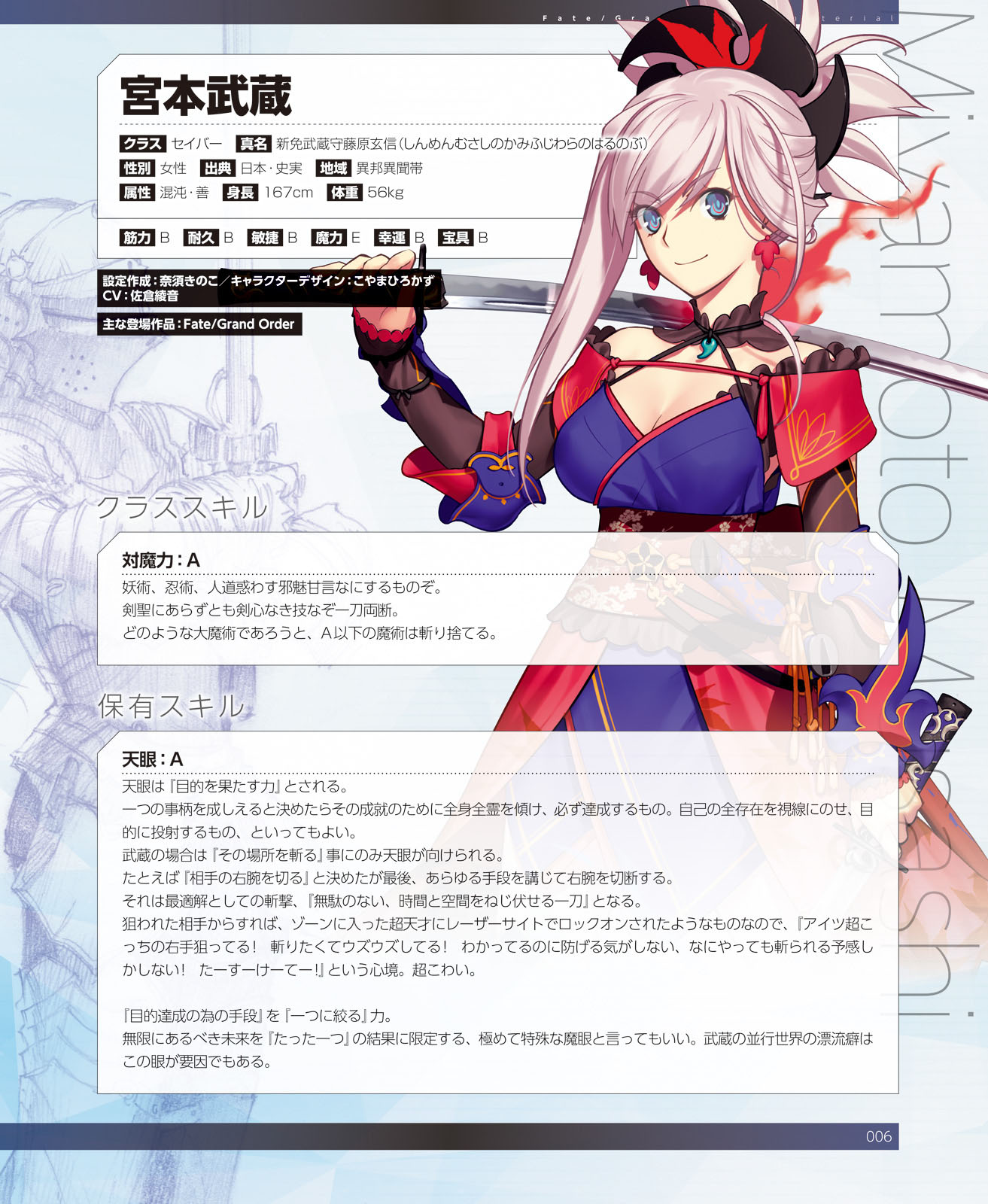





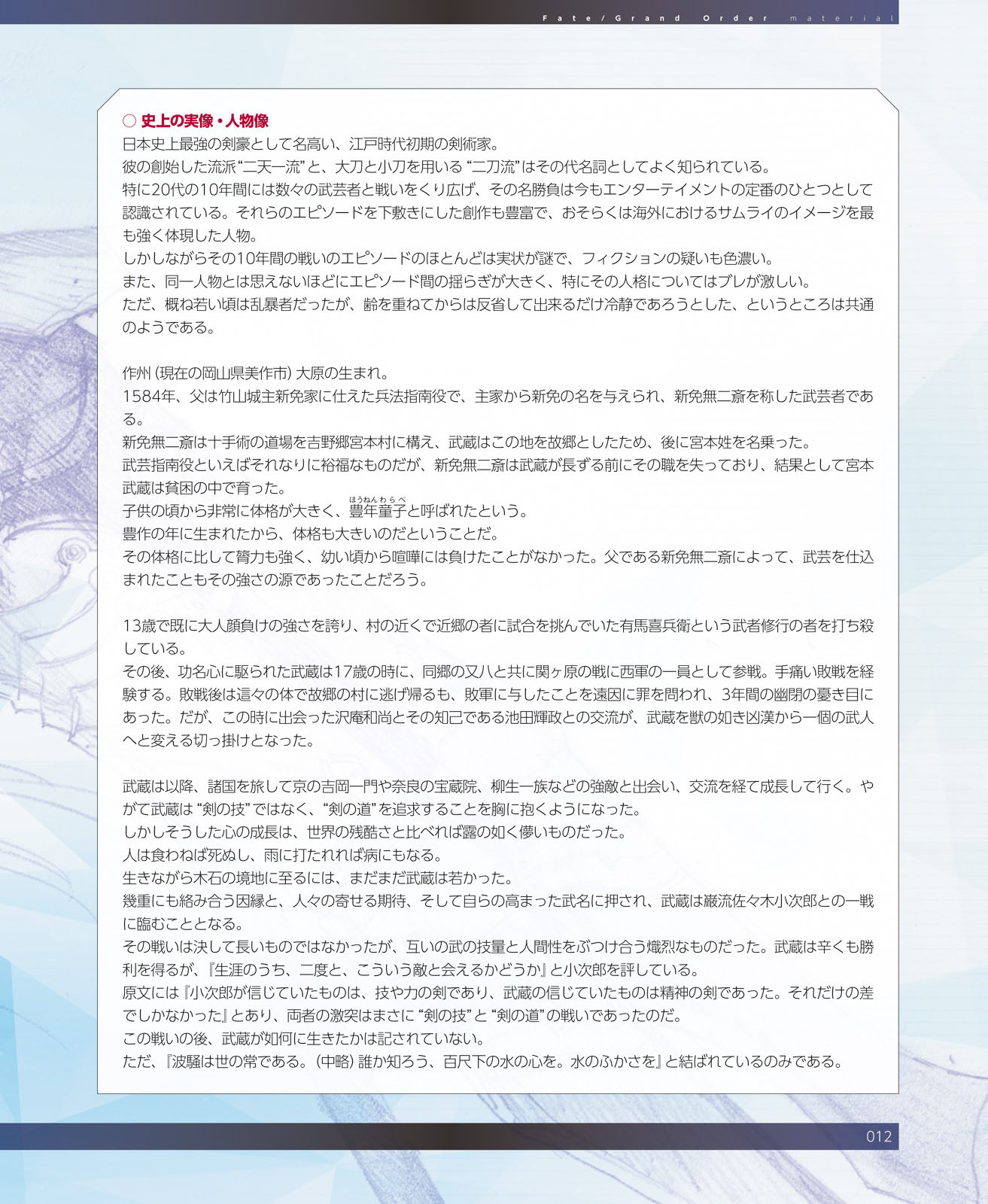

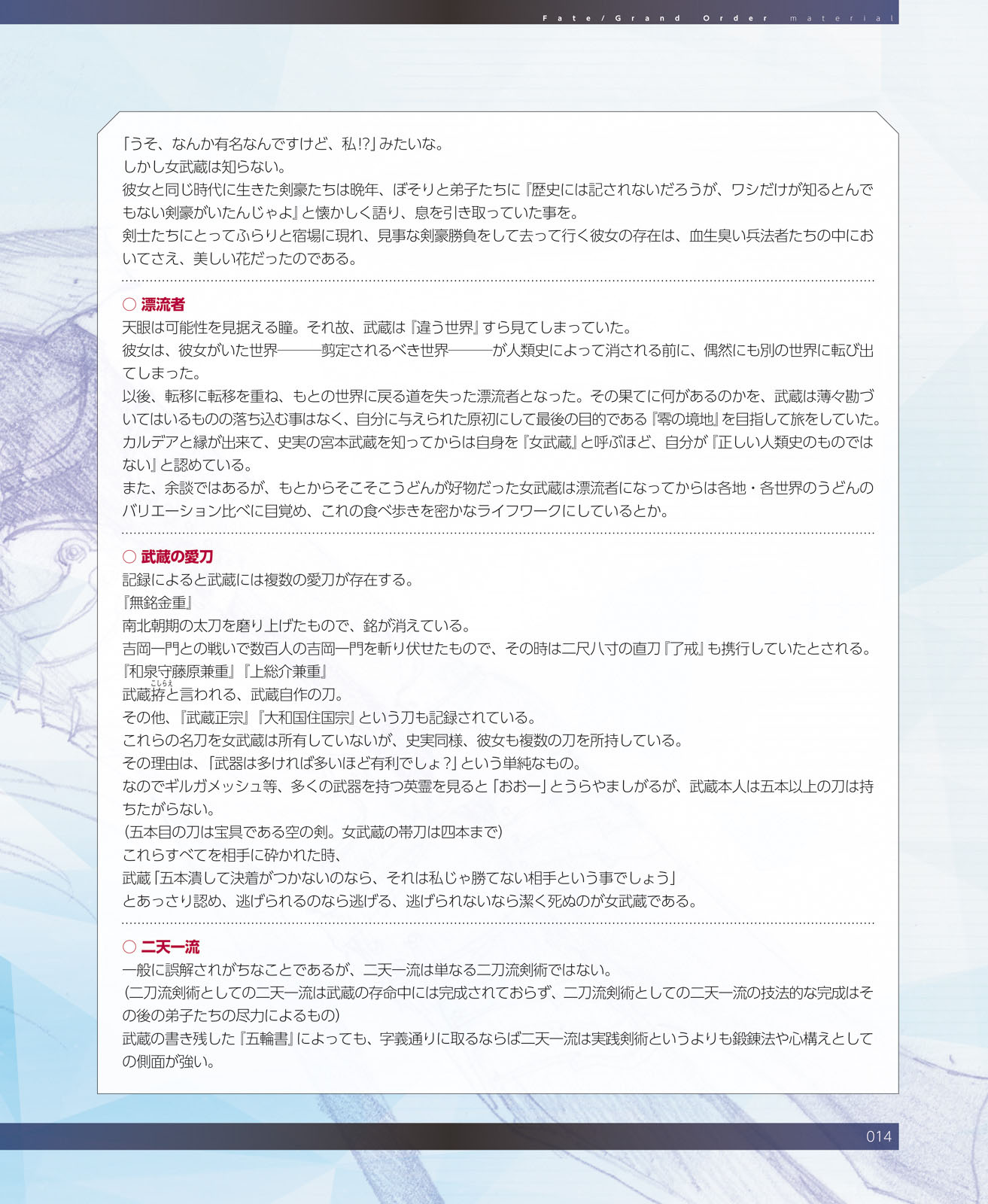


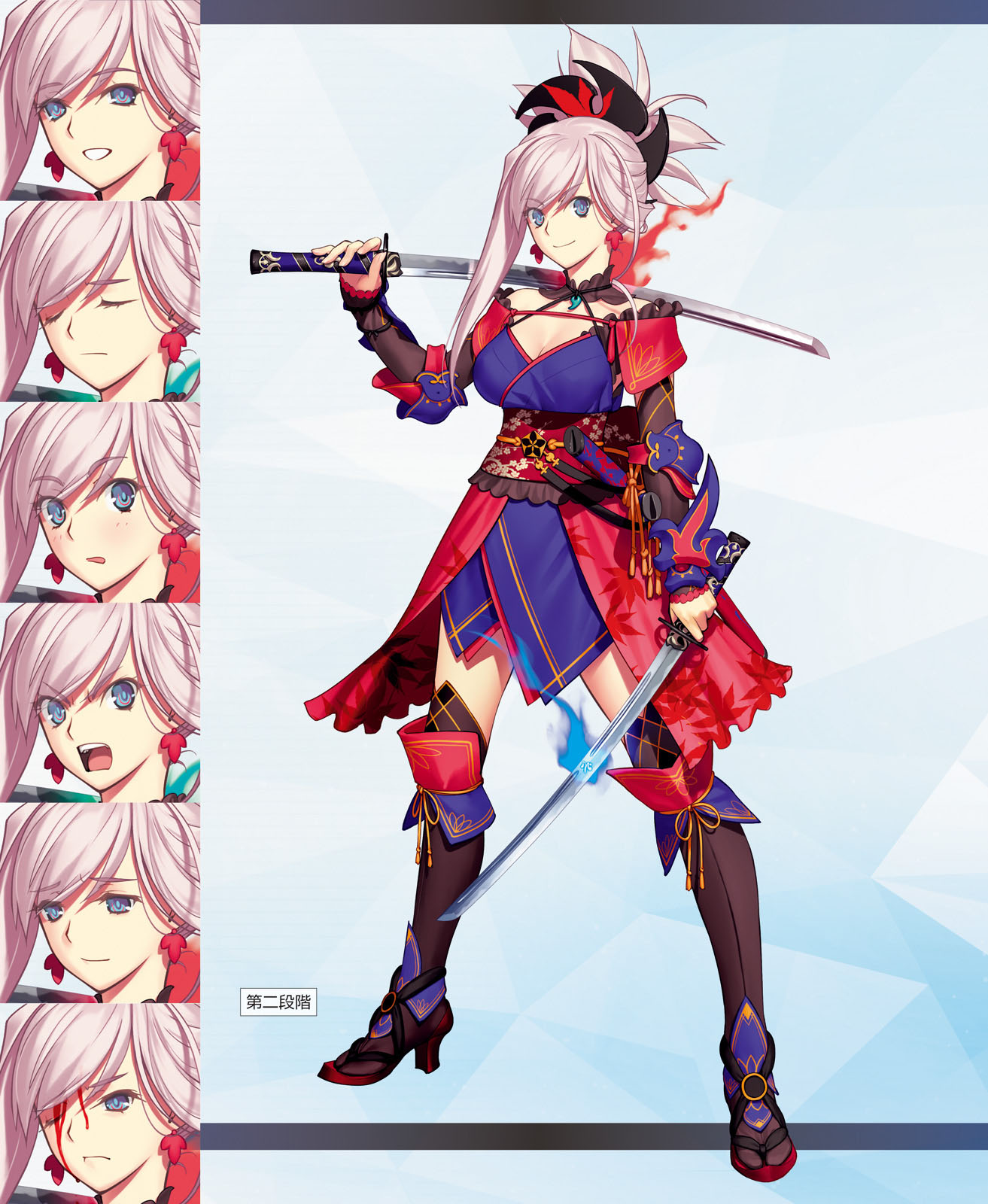




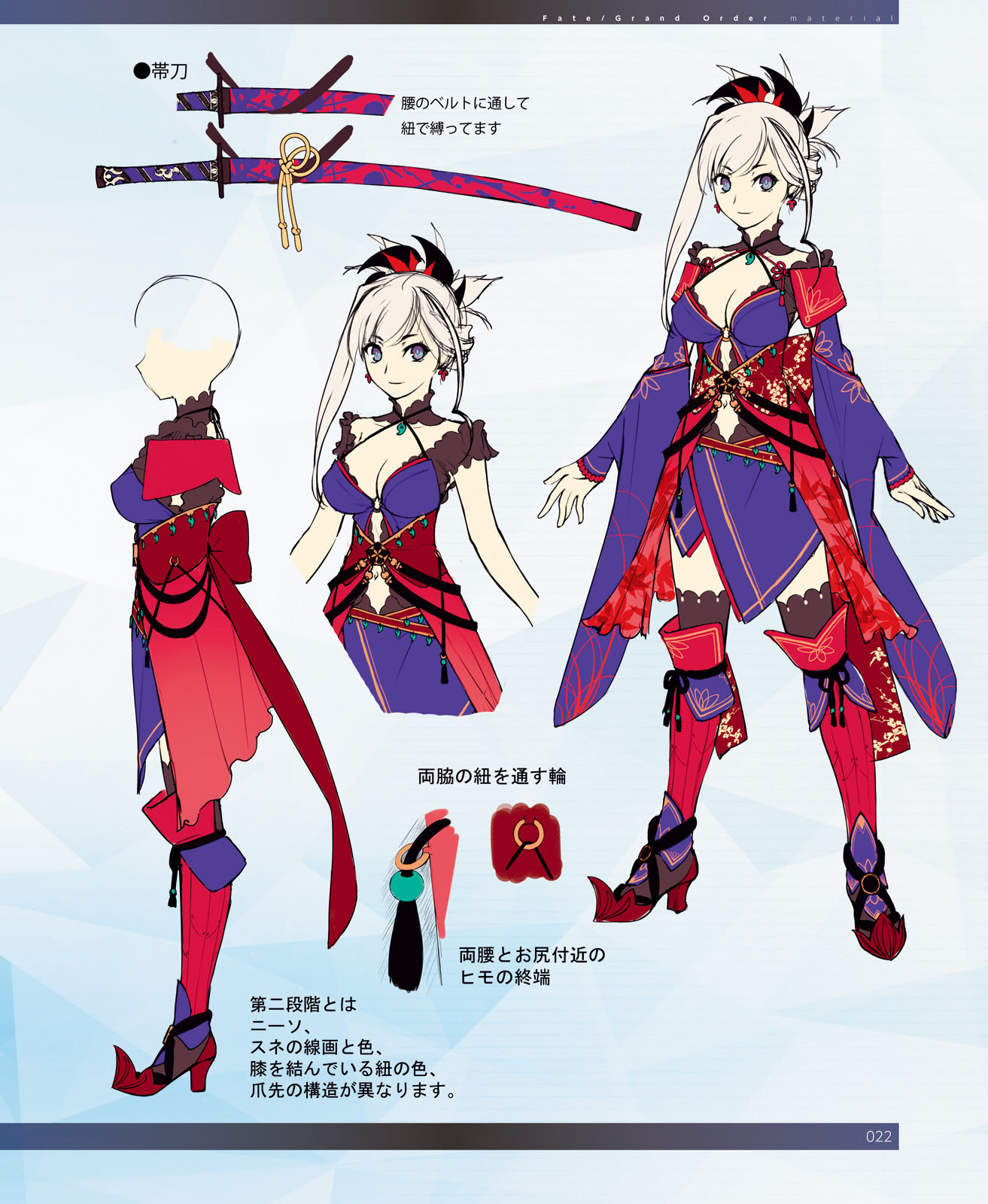

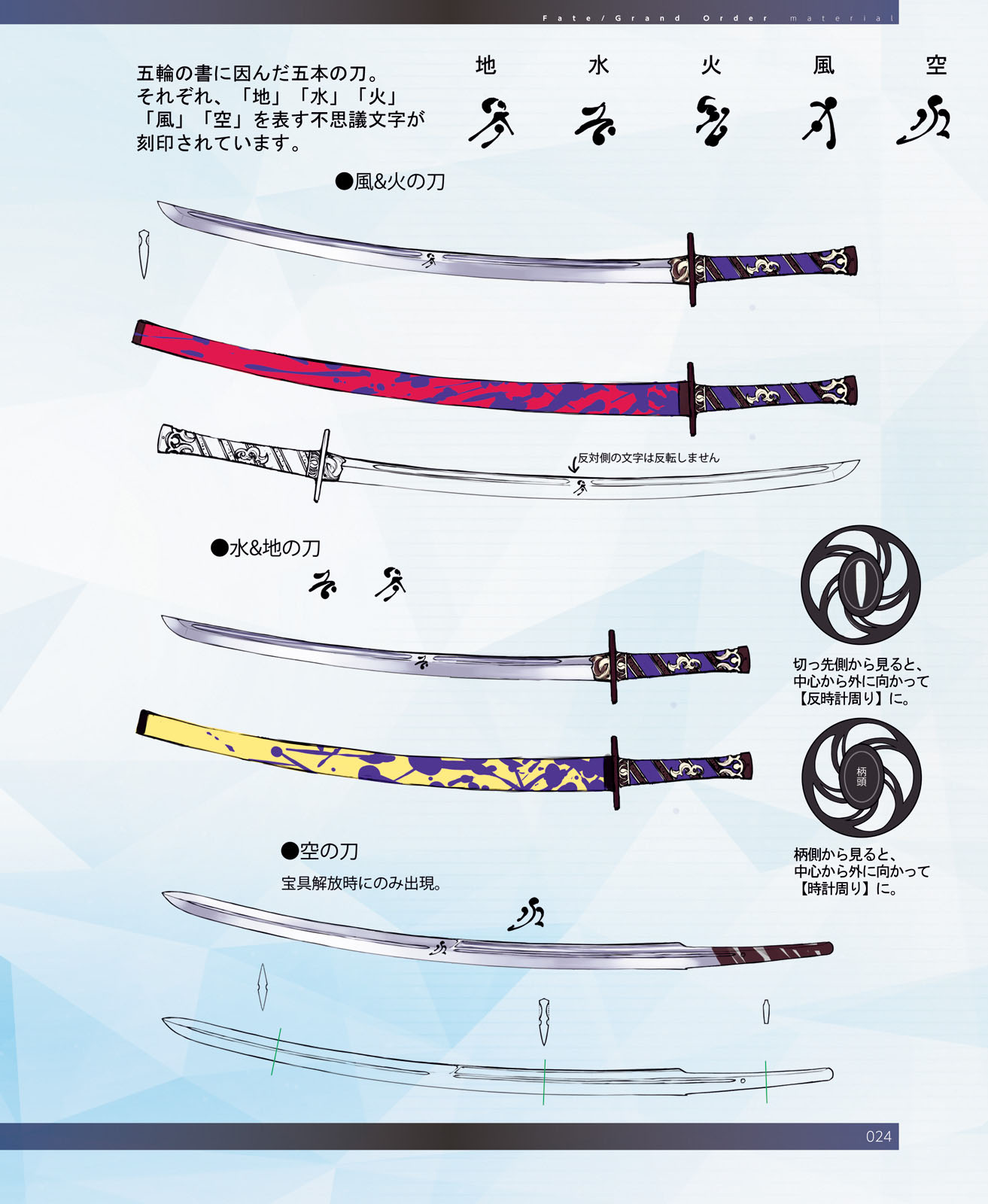



Dialogue
| Occassion | English | Japanese |
|---|---|---|
| Summoned |